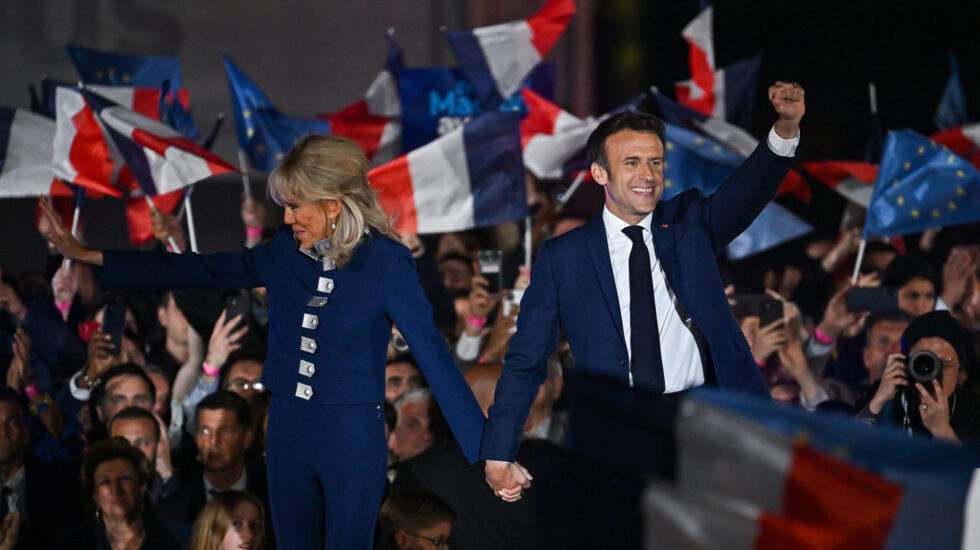French President Emmanuel Macron was re-elected on Sunday, garnering 58.54% of all votes. He’s the first incumbent French President to win a second term since 2002.
But Macron’s opponent, far-right iconoclast Marine Le Pen, won something of a moral victory that reflects the nation’s embrace of right-wing nationalism.
“With 41.5 percent of the vote, unprecedented for her, Le Pen’s anti-foreigner, anti-system politics of disgruntlement are now more entrenched than ever in the psyche, thinking and political landscape of France,” writes Al Jazeera.
On Sunday night, Le Pen told her supporters that despite the loss, “we have nevertheless been victorious.”
“The ideas we represent are reaching a peak,” she added.
Al Jazeera continues:
Since the Le Pen dynasty – first her dad, Jean-Marie, and now Marine, his daughter – first started contesting presidential elections in 1974, never have so many French voters bought into their doctrine that France would be richer, safer and somehow more French if it was less open to foreigners and the outside world.
Marine lost 66 percent to 34 percent to Macron in 2017 and Jean-Marie was trounced 82 percent to 18 percent by Jacques Chirac in 2002.
The Atlantic provides additional context:
In a little more than a decade, she has succeeded in transforming her party, the National Rally (formerly the National Front), from a toxic fringe group to one of the most significant players in French politics. She has advanced to the presidential runoff twice, but perhaps most significant of all, she has normalized her far-right politics on Islam and immigration and has forced her mainstream opponents—Macron among them—to engage with, and in some cases even appropriate, her views.
This isn’t victory in the traditional sense, but it isn’t defeat either. The staying power of populist and nationalist groups across Europe has shown that these forces don’t necessarily need to win elections in order to see their aims through. From Britain to Germany, they have proved just as capable of influencing politics from the sidelines, and sometimes even getting mainstream parties to do their work for them.
The Atlantic also notes that Le Pen’s rise has forced Macron to embrace some of her ideas:
In Macron’s 2017 victory speech, he pledged to spend his first term doing everything he could to ensure that French voters would “no longer have any reason to vote for the extremes.” In practice, however, this has meant pivoting to the right on issues such as immigration, security, and national identity, and occasionally parroting far-right talking points. New laws aimed at curbing terrorism and extremism afforded the government greater powers to track religious groups and close houses of worship. This rightward shift was intentional. In an interview last year with the Financial Times, Macron’s interior minister Gérald Darmanin, who once accused Le Pen of having “gone soft” on Islam, argued that courting Le Pen’s voters would be essential to preventing her from taking more votes.
Cas Mudde, a political scientist at the University of Georgia and a leading expert on populism and the radical right, told The Guardian that Macron’s win is “in the short-term really a relief.”
“But in the long-term,” Mudde added, “it is kicking the can down the road.”
The New York Times reports that Le Pen’s recent momentum is good news for Russian President Vladimir Putin:
Over the past decade, Ms. Le Pen’s party, the National Rally, formerly the National Front, has borrowed millions from a Russian bank, and Ms. Le Pen has supported Mr. Putin’s annexation of Crimea in 2014, as well as his incendiary meddling that year in the Donbas region of eastern Ukraine, where just this week Russia redoubled its offensive.
The Times adds:
The Ukraine war has caused Ms. Le Pen to pivot a little by saying Mr. Putin crossed “a red line” with the invasion, but she still says her foreign-policy priority is a rapprochement with Russia once the fighting stops.



